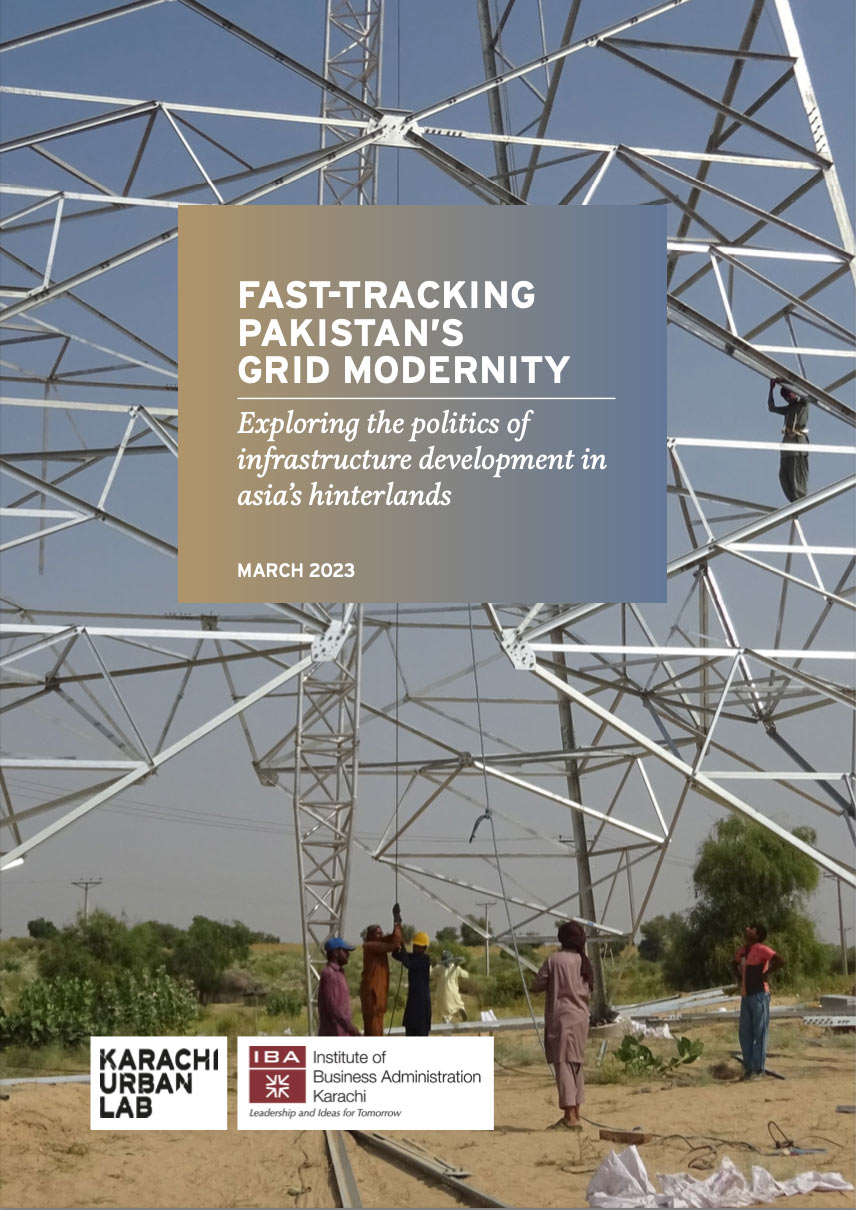
In Pakistan today, infrastructure is a site of renewed political attention. In this working paper, we propose that these large-scale infrastructure projects constitute a vision of fast-tracking Pakistan’s grid modernity where the ‘grid’ – as an infrastructural object and as a space of violence - indexes a relationship to land, ecology and a politics of (dis)connectivity with struggles for entitlements, rights and recognition. The grid assigns specific meanings to spaces – fences, lines, boundaries, parcels - to control the human/nonhuman social and physical worlds, and this instigates localized understandings of economic and social uncertainty. Through the twin analytics of land and energy, we see the grid as an object designed to facilitate flows as well as a powerful technology of statecraft or disciplinary rule that disentangles land and common-property resources from local social relations and reconfigures them as private property. Thus, the grid is a potent site for investigating a politics of power that incorporates the promise of socio-economic progress amid anxieties of social exclusion, ecological degradation and displacement.

Pakistan is home to diverse geographies of land displacement, which are accelerating in an era of rapid urban development. This paper summarises the findings and recommendations from a 28-month research project which charts - for the first time - the contemporary context of land displacement in urban Pakistan, through the lens of its largest city, Karachi.

پاکستان کے شہروں میں زمین اور گھر سے بے دخلی کے مختلف جغرافیے موجود ہیں۔ مقامی سطح پر یہ وہ سیاسی مقامات ہیں جن کی تشکیل تاریخی، معاشی اور سیاسی قوتوں نے کی ہے۔ اس دستاویز میں ۲۸ ماہ کے منصوبے کے نتائج اور سفارشات کا خلاصہ پیش کیا گیا ہے، جس میں پہلی بار شہری پاکستان میں زمین اور گھرسے بے دخلی کی تاریخ اور عصری تناظر کو تحقیقی اندازمیں پیش کیا گیا ہے اور اس کے سب سے بڑے شہر کراچی کے حوالے سے مطالعہ کیا گیا۔ کراچی کی آبادی ۱۶ ملین ہے جبکہ غیر سرکاری آبادی طور پر اس کی آبادی ۲۵ ملین ہے۔
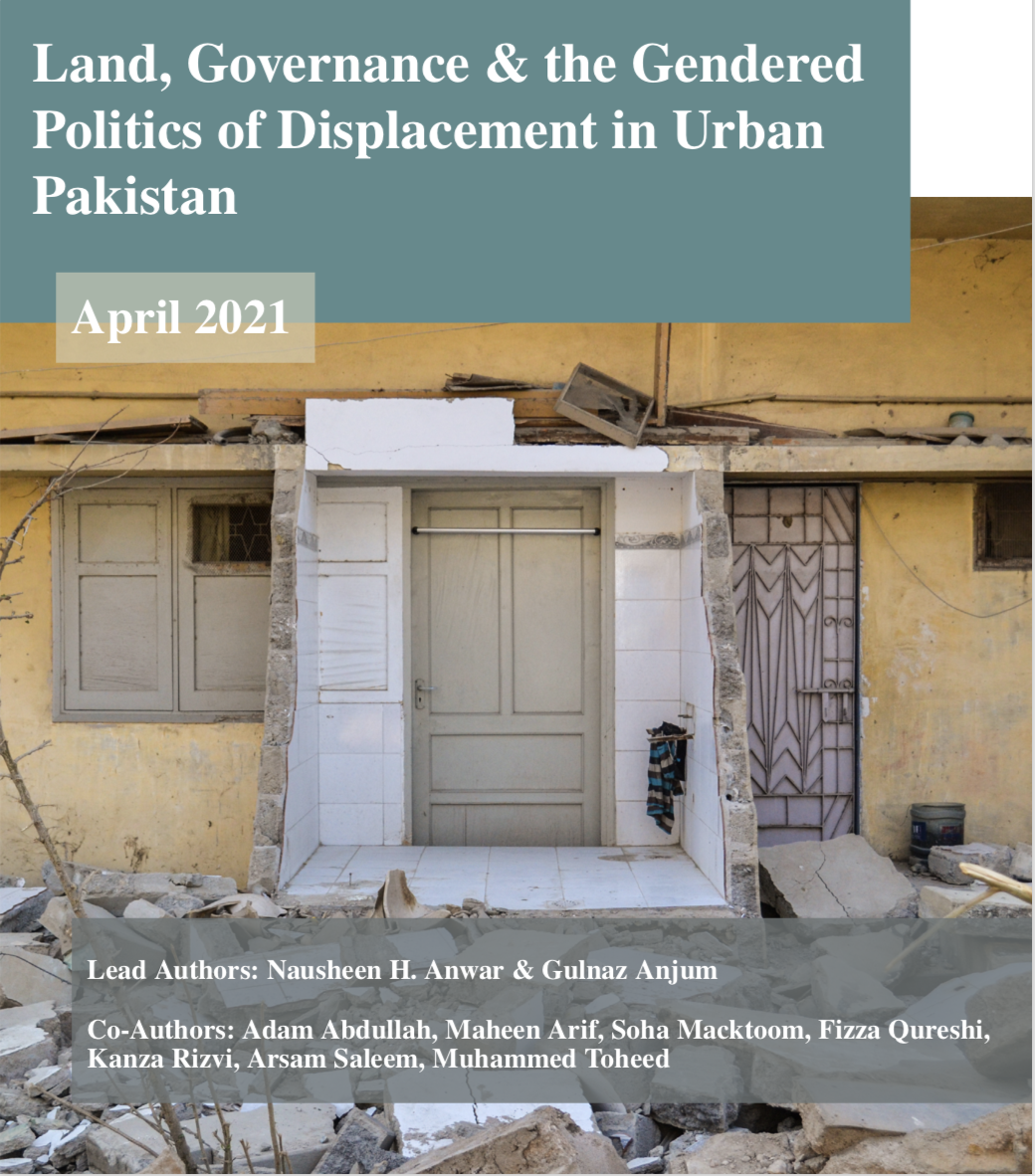
In the past two decades of intensified mega-infrastructural and urban development projects in Karachi, an estimated 600,000 urban poor, low-income, working class and marginalized communities have been displaced with less than 33 percent of them receiving any form of resettlement or cash compensation. This report documents how land is governed and acquired for infrastructure and urban development projects; how land displacements mpact people’s lives and their communities; and how people resist displacement in Pakistan's largest metropolis. The findings emerge from a 24-month project covering 16 study sites in Karachi, called Land, Governance & the Gendered Politics of Displacement in Urban Pakistan, and funded by the International Development Research Centre (IDRC). What makes this present moment of land displacements and struggles particularly complex, is the interlocking of emergent neoliberal policies with colonial genealogies of managing and appropriating land, as well as post-Partition legacies of housing crisis and land informalization that dovetail today with the emergence of the courts as key sites of urban planning and governance in a bid to restore law and order in the city. Land displacements have severe consequences: loss of home, livelihoods, community, and social networks; engendering a permanent state of anxiety and uncertainty; increasing physical, social, and environmental vulnerabilities; compounding gender inequalities; and irrevocably damaging social and economic mobility. These effects are especially pernicious because displacement is not a one-time event. Displacement is an intensely traumatic and violent experience with differentiated impacts on men and women, and the wellbeing related consequences for those who have experienced displacement or are at risk of losing their land. The report also charts the complex, evolving and rich terrain of solidarities, protests, and grassroots activism that is gradually shaping resistance against land displacements in Karachi. We place this complex process of resistance in shifting atmospheres of hope, and expectation that can quickly dissolve into despair and waiting. These shifts epitomize the extensive labors of ordinary women and men who come together in given moments, to forge connections in their common struggles to achieve the same goal. The contestations and conflicts over displacement demonstrate how the right to land as a right to citizenship, remains differentiated and unacknowledged by the Pakistani state. With future displacements anticipated in the context of new urban planning, infrastructure development, and disaster risk management interventions in Karachi, we offer recommendations for addressing the exclusions that arise from land displacement.
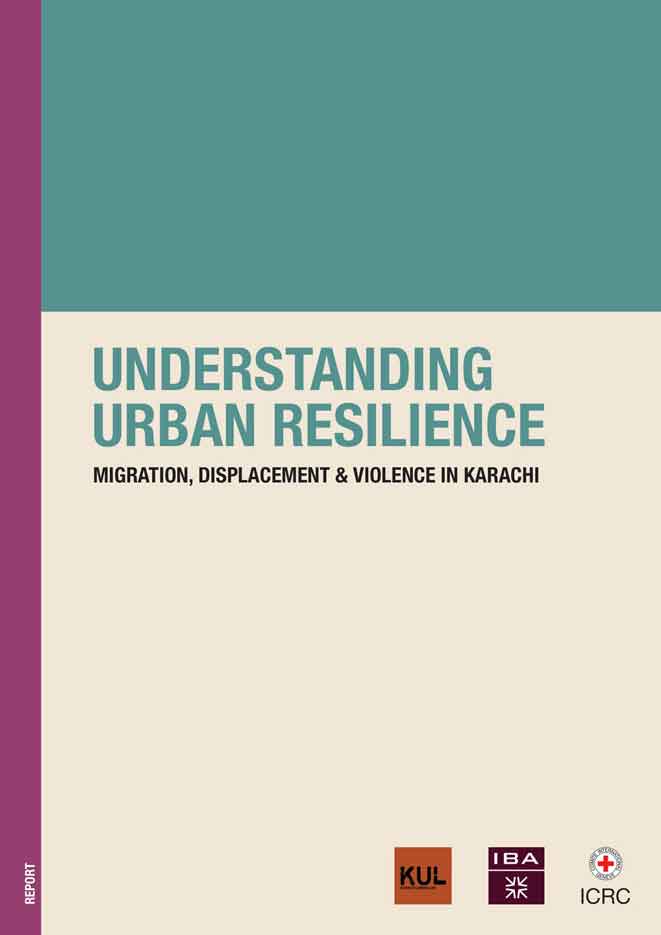
This report is the final output of an ICRC (International Committee of the Red Cross) funded 10-month project. The Principal Investigator was Ms Abira Ashfaq, Lawyer & Visiting Faculty, Department of Social Sciences & Liberal Arts, IBA, and the Co-Investigator was Professor Nausheen H Anwar, Department of Social Sciences & Liberal Arts, IBA.
The project investigated how deep-seated inequalities in the distribution of economic, political, and social resources, influence migrants’ capacity for resilience in the face of forcible displacement. These inequalities and injustices are constructed along the lines of gender, minority status, citizenship, informality of labor, and rural geography, and are solidified through the use of both overt and tacit political violence in which the state itself is complicit. Overt violence is police high-handedness - unlawful stops, unreasonable use of force and extortion - and tacit forms of institutional violence may include the state's collusion with private interests, inaccessibility of justice systems, erasure from maps and records, and state abdication in service delivery. The report’s main findings are that political or institutional violence exacerbate vulnerability and impact a migrant group's capacity for resilience.
The report covers 10 study sites in Karachi - many are unplanned settlements that have emerged in the past decade on Karachi’s edges, and are a result of different kinds of migration trajectories. The report provides a constructive contribution for understanding some of the key dynamics that are shaping people's decisions to migrate to cities like Karachi, and the extraordinary difficulties they are facing not only in making such decisions, but what is happening to them as they find themselves ensconced in the city's spaces, where the temporariness of work and housing, disconnected infrastructures and exposure to institutional and political violence, make their lives increasingly precarious. A crucial point this report makes is, if the state does not acknowledge and engage positively with the new processes that are shaping ordinary lives and spaces in the city, then solutions to poverty and inequality will remain elusive.
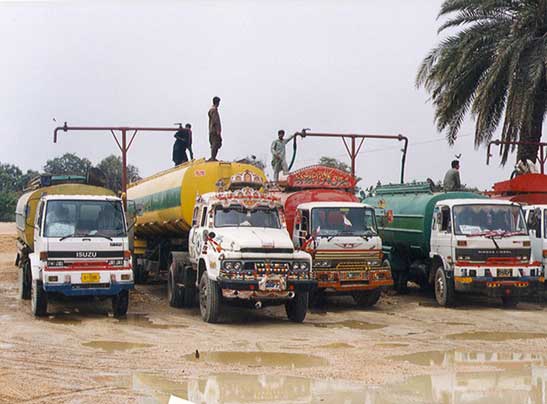
This multi-authored article (2019) provides new insights into the politics of water provisioning in Karachi’s informal settlements, where water shortages and contaminations have pushed ordinary citizens to live on the knife edge of water scarcity. We turn our attention to the everyday practices that involve gendered insecurities of water in Karachi, which has been Pakistan’s security laboratory for decades. We explore four shifting security logics that strongly contribute to the crisis of water provisioning at the neighbourhood level and highlight an emergent landscape of ‘securitised water’. Gender maps the antagonisms between these security logics, so we discuss the impacts on ordinary women and men as they experience chronic water shortages. In Karachi, a patriarchal stereotype of the militant or terrorist-controlled water supply is wielded with the aim of upholding statist national security concerns that undermine women’s and men’s daily security in water provisioning whereby everyday issues of risk and insecurity appear politically inconsequential. We contend that risk has a very gendered nature and it is women that experience it both in the home and outside.
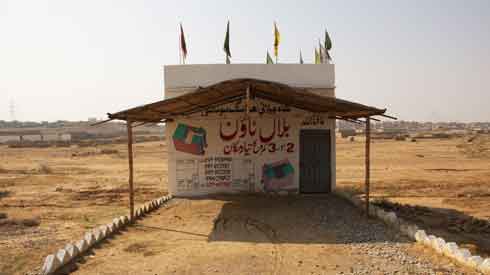
Based on seven years of fieldwork and ongoing engagements with Karachi’s periphery, this paper (2018) advances a new perspective on the agrarian-urban frontier as constitutive of a new value regime and politics in Pakistan.

Looking at border towns in Iran and Pakistan, this paper (2016) considers how mobile urban networks, infrastructures and flows of commodities stretch and coalesce in an age of intensified urbanization.
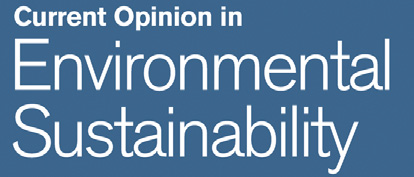
This multi-authored concept paper (2016) considers the complex nature of urbanization across the globe, and the seemingly insurmountable challenges of transforming urban futures that require multi-disciplinary, multi-stakeholder research efforts across diverse geographies.
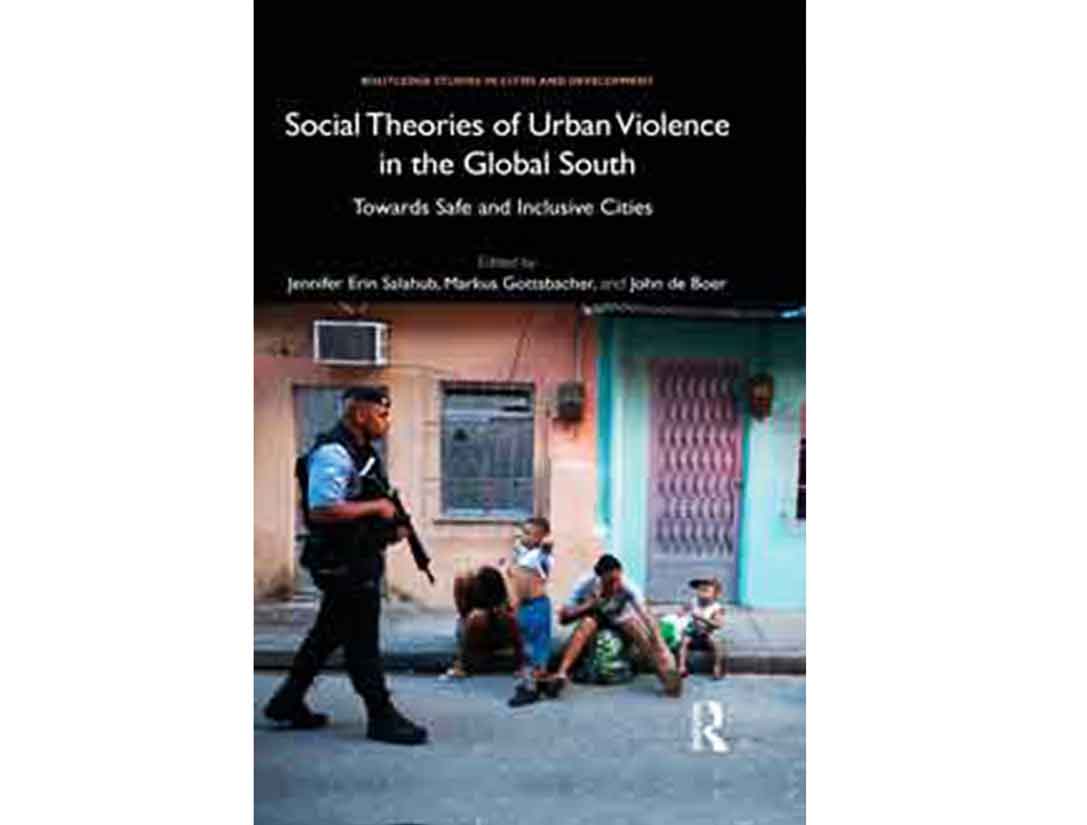
The South Asian city is changing fast. There are more women in urban centers than ever before and they are joining the workforce, albeit more in the informal sector. But the benefits of urbanization do not accrue equally to men and women. Despite women’s need to travel within cities to access economic and educational opportunities, they are still habitually harassed for being out in public spaces. In this chapter (2018) that appears in the edited book Social Theories of Urban Violence in the Global South (Routledge), the authors consider the problems that women experience with mobility in Pakistan’s cities, as they challenge traditional gender roles.
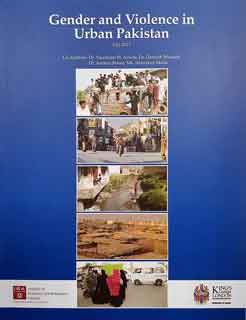
The report is the final output of the Safe and Inclusive Cities Program (SAIC) project (2013 – 2016). The project has focused on the material and discursive drivers of gender roles and their relevance to configuring violent geographies specifically among 12 urban poor, lower-income, lower-middle income, neighborhoods of 3 cities: Karachi, Rawalpindi, and Islamabad. The project has investigated how frustrated gendered expectations may be complicit in driving different types of violence and how they may be tackled by addressing first, the material aspects of gender roles through improved access to infrastructure services and opportunities, and second, discursive aspects of gender roles in terms of public education and media. This report's findings are based upon approximately 2400 hundred questionnaire surveys, close to 60 ethnographic style interviews, participant observations, participatory photographic surveys, media monitoring, secondary literature review and some key informant interviews. The findings overwhelmingly point towards access to services and vulnerability profiles of households as major drivers of violence, as they intersect with discourses surrounding masculinities, femininities and sexualities. The core discussions and analysis in this final research report are anchored in the following four themes: vulnerabilities, mobilities, access to infrastructure services, and violence. This was a multi-method research project and each of the methods was chosen to address specific types of data relevant to the specific research questions.